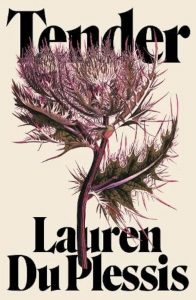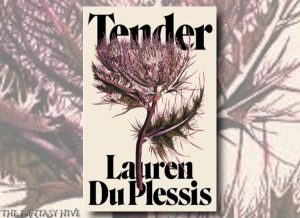TENDER by Lauren Du Plessis (BOOK REVIEW)
“Being a plant seems simple. It all makes sense.”
“Simpler than being human?”
“Right. A plant doesn’t have a nervous system. It doesn’t need thoughts. It’s just hormones and reactions. Auxin and phototropism. The plant detects light, and it grows towards it. It’s that simple. And from that we get roses, dahlias, Venus flytraps…”
Tender is Lauren Du Plessis’ remarkable debut novel. It’s a literary work of botanical body horror that dives deep into the troubled psyche of its protagonist and builds to a wonderfully disturbing climax. Du Plessis draws a compelling portrait of a woman whose façade that she presents to the outside world comes under attack from outside forces. Tender is an exploration of a woman undergoing a breakdown, an excoriation of the numerous pressures our society puts on women, and a horror story about what happens when the nature we have severed our connection with through civilization comes to claim us back. It’s a mesmerizing slow-burn of a horror novel, and a work that demonstrates just how much literary fiction can bring to horror and vice-versa.
 Nell is an archeobotanist with perfectly manicured nails and a meticulously curated Instagram feed. She’s just landed a dream job, working on an expedition to unearth two bog bodies from a Somerset fen. It’s the kind of assignment that could make her career, if only she can just not blow it. For under Nell’s meticulous exterior beats a whirlwind of utter chaos, one that is only exacerbated when the flowers they dig up from inside the skulls of the bog bodies start appearing on her skin. A visit to the doctor convinces her that only she can see the flowers beginning to burst from all over her body, but this outside manifestation of chaos stems from deeper. Soon Nell is throwing all caution to the wind, entering into a destructive and toxic relationship with fellow archeobotanist Gunner, displaying erratic theories and behaviour that aggravate her supervisors Ingrid and Bill, and falling into an intense friendship with Beth, the farmer who owns the land the bodies were found on. The Somerset fen is close to the house where Nell grew up with her estranged sister Liz and their abusive mother, and as her life in the present begins to spiral increasingly out of control, it shows up the buried resentments and faults that lie festering at the heart of her family relationships. Can Nell regain control before her past and her present conspire to utterly transform her future?
Nell is an archeobotanist with perfectly manicured nails and a meticulously curated Instagram feed. She’s just landed a dream job, working on an expedition to unearth two bog bodies from a Somerset fen. It’s the kind of assignment that could make her career, if only she can just not blow it. For under Nell’s meticulous exterior beats a whirlwind of utter chaos, one that is only exacerbated when the flowers they dig up from inside the skulls of the bog bodies start appearing on her skin. A visit to the doctor convinces her that only she can see the flowers beginning to burst from all over her body, but this outside manifestation of chaos stems from deeper. Soon Nell is throwing all caution to the wind, entering into a destructive and toxic relationship with fellow archeobotanist Gunner, displaying erratic theories and behaviour that aggravate her supervisors Ingrid and Bill, and falling into an intense friendship with Beth, the farmer who owns the land the bodies were found on. The Somerset fen is close to the house where Nell grew up with her estranged sister Liz and their abusive mother, and as her life in the present begins to spiral increasingly out of control, it shows up the buried resentments and faults that lie festering at the heart of her family relationships. Can Nell regain control before her past and her present conspire to utterly transform her future?
Tender is a masterclass in the psychological slow burn. Nell presents to both the world and the reader such a carefully curated version of herself that she must be hiding something; beneath the repressed and uptight exterior is something wild and passionate waiting to be birthed. As events at the dig and in her personal life spiral more and more out of her control, and she makes increasingly poor decisions, we learn more about her as a person and how she’s arrived at this place. The new job arrived in the nick of time, as Nell had just lost her previous job. Her relationship with her sister Liz seems inexplicably tense, until we learn that Nell is responsible for the childhood illness that nearly killed Liz. Meanwhile Nell finds herself in conflict with Ingrid and Bill, who view her affair with Gunner as indiscreet and caution her against bringing her theory of human sacrifice to the press before they have more evidence from the dig. As the narrative progresses, it becomes clear that Nell has repressed so much of her past trauma and desperately wants to compartmentalize her life, but her encounter with the bog bodies has awakened everything in herself that she tries so hard to control.
This loss of control physically manifests itself through the flowers bursting through Nell’s skin. The botanical represents everything that Nell’s mother has taught her to repress, but from Nell’s childhood she has had an uncanny connection to the botanical that her mother is unable to control. In adulthood she has sublimated this chaotic other self into her archeobotanical studies. Academic studies allow her to an extent to indulge her fascination with the world of plants while maintaining a pretense of objective distance, but as soon as she uncovers the skulls bursting full of flowers Nell is faced with the unavoidable truth that we are a part of nature, not something that can stand objectively apart from it. Nell ultimately undergoes a metamorphosis, from which a new Nell must be born that can fully embrace her connection with nature. Du Plessis expertly captures both the exhilaration and the terror of giving oneself up to something larger than oneself. This is ultimately a necessary process for Nell to truly be able to exert her own agency in her life.
Tender’s moments of surprising and inventive body horror, particularly in the book’s brilliant final sequence, are all the more shocking for occurring in an otherwise realistic and believable world, populated by well-drawn characters. Nell’s struggles with getting and keeping a job in academia after getting her doctorate will be familiar to anyone currently dealing with UK academia. The (female) doctor’s dismissal of Nell’s bizarre symptoms and her insistence that it’s purely psychological will be familiar to any woman who’s struggled to get the doctor to believe her reports of her own illnesses. Until the finale, one of the novel’s most horrific sequences occurs in an academic conference, where Nell’s attempts to network are disrupted by the complete collapse of her relationship with Gunner. These well-observed aspects make the eruption of botanical violence at the novel’s climax all the more powerful and unsettling.
Tender is successful as both a striking work of folk horror and a compelling character study. Its sense of untamed urges bursting through a civilized, cultivated exterior wonderfully captures our fear of and desire for a return to a wilder existence. Du Plessis handles her characters with conviction, forcing them into ever more uncomfortable confrontations with their inner selves. It’s a remarkably assured debut, and I very much look forward to seeing what Du Plessis has in store for her readers next.
Tender is available now – you can order your copy on Bookshop.org


[…] face her estranged family, Tender was an instant hit with The Fantasy Hive’s Jonathan Thornton (review). Lauren was kind enough to talk to him in Liverpool just before an event at the Dead ink Bookshop […]